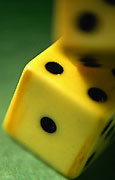Hopeless Desperation
Article written by Tony Bellanca, Prevention Works Gambling Prevention Specialist, 2010
 Most people look at gambling as a harmless activity engaged in for fun, excitement, and the possibility of winning the “Big One.” With the increased availability and accessibility of gambling opportunities, gambling seems to have become a way of life. In the State of New York, we have several casinos, a state lottery, many types of scratch –off tickets, Quick Draw, horse racing, pull tabs at local clubs and Bingo – all legal forms of gambling. In addition, New York State participates in the Power Ball and Mega Millions with several other states.
Most people look at gambling as a harmless activity engaged in for fun, excitement, and the possibility of winning the “Big One.” With the increased availability and accessibility of gambling opportunities, gambling seems to have become a way of life. In the State of New York, we have several casinos, a state lottery, many types of scratch –off tickets, Quick Draw, horse racing, pull tabs at local clubs and Bingo – all legal forms of gambling. In addition, New York State participates in the Power Ball and Mega Millions with several other states.
With that as a back drop, it is fair to say, most people gamble without any negative consequences. However, there is a small percentage (1–3%) of gamblers who suffer enormous social, economic and psychological consequences. A vast majority of gambling related crimes are non-violent—embezzlement, check forgery, credit card fraud, tax evasion, insurance fraud and employee theft.
There is one other unexpected risk which doesn’t get a great deal of attention or coverage for obvious reasons—that risk is suicide. Almost 85% of people with gambling disorders who attend Gamblers Anonymous meetings admit to having contemplated suicide (ideation). Many suicides go unreported as gambling related but are reported as medication overdoses or car accidents. Many Gamblers Anonymous members state, “I was driving on the freeway and the thought came into my head, why don’t I just drive head on into a tractor trailer? I would go out a hero. My family’s financial problems would be solved with the insurance money. No one will ever think it was a suicide, it was just an accident.” This is that place of “Hopeless Desperation” people with gambling disorders find themselves in when their gambling spirals out of control. In addition, women are just as vulnerable to gambling disorders as men. Some experts say women are even more vulnerable due to the nature of the type of gambling women prefer—VLT’S (Video Lottery Terminals)and EGM’S (Electronic Gaming Machines). These are essentially all forms of slot machines and poker machines which have been referred to as the “crack cocaine” of gambling.
The American Psychiatric Association declared a gambling disorder as an illness 30 years ago in its Diagnostic and Statistical Manual (DSM). Recent research by the National Council on Responsible Gambling (NCRG) in 2006 found that cities with legalized gambling had higher suicide rates than comparably sized cities without legalized gambling.
In Detroit, Michigan, a Detroit detective pulled out a gun and shot himself in the head after losing $3500 at a Black Jack table. News media in western New York have reported on several attempted or completed suicides. A man rescued from the edge of Niagara Falls was reported as gambling related; reports of businessesbeing seized by the IRS for non-payment of federal taxes were gambling related; reports of women being charged with embezzlement for stealing money from employers and senior citizens losing work retirement benefits and 401K investment plans are often gambling related. The list goes on and on.
 A study done by Hogkins, Mansley and Thygeson at the University of Calgary, Canada (2002) stated that 28.7% of people with gambling disorders had no suicidal thoughts, 38.6% had suicidal thoughts, and 32.7% reported a suicide attempt. This report did not include the number of successful suicides. As stated earlier, those findings get lost in the reporting of the death of an individual.
A study done by Hogkins, Mansley and Thygeson at the University of Calgary, Canada (2002) stated that 28.7% of people with gambling disorders had no suicidal thoughts, 38.6% had suicidal thoughts, and 32.7% reported a suicide attempt. This report did not include the number of successful suicides. As stated earlier, those findings get lost in the reporting of the death of an individual.
In addition, this study found that having an alcohol or drug history increased the likelihood of a suicide attempt by six times. There were additional links made to depression, gambling and suicide. The latest information from the Substance Abuse and Mental Health Services Administration (SAMHSA), the New York State Office of Addiction Services and Supports (OASAS) and other mental health organizations is that co-occurring addictions can and do include gambling which makes assessment and treatment of a gambling disorder as an additional target problem behavior.
Las Vegas has the highest level of reported suicides in the nation for residents and visitors to Las Vegas. In Atlantic City, abnormally high suicide levels for visitors and residents appeared only after gambling casinos were opened. The hypothesis to be drawn from this information is:
- Gambling or some factor clearly associated with gambling settings is linked to elevated suicide levels.
- Recent expansion of legalized gambling and the subsequent increase in gambling settings may lead to an increase of suicides in the U.S.
To support these findings, the following research reinforces the hypothesis:
- Medical examiners in Alberta, Canada suspect at least one out of every 10 suicides is gambling related;
- In 1999, more than 429 Nevada residents committed suicide;
- In Gulfport, Mississippi, suicides increased by 213% (from 24 to 75) in the first 2 years after casinos opened;
- Biloxi, Mississippi had an increase of 1000% (6 to 66) gambling related suicides;
- A survey of 200 Gamblers Anonymous members in Illinois showed 66% had attempted suicide, 79% hadwantedto die, 45% had a definite plan to kill themselves, and 16% actually attempted suicide
- News reports of a murder-suicide in Louisiana (gambling related), carbon monoxide poisoning in a running car in Louisiana (gambling related), a hanging in a hotel room and someone jumping off a hotel parking garage in Atlantic City (gambling related), and even closer to home in Chautauqua/Erie/Cattaraugus counties within the past few months were two suicide attempts, one successful and one not, both gambling related.
 Two populations that seem to be more vulnerable to this type of action are women and senior citizens. Women experience more shame and guilt due the stigma attached to gambling disorders which for many years was primarily a man’s problem. Women work in situations that enable them to manipulate money and defraud employers such as civic organizations, churches, banks, school districts, etc. They experience legal problems more readily due to the nature of gaming machines and their addictiveness. Faced with jail and what seems like an impossible task of paying off a debt along with the public humiliation for family, children, friends and loved ones, women look at suicide as the way out. On the other hand, senior citizens present a different set of circumstances. Issues such as loneliness due to loss of a loved one, depression, health related issues and failure to take or purchase needed medications affect the judgment of senior citizens. With the loss of retirement income, retirement plans (401K), home, family, all financial resources drained and with no way of recouping gambling losses, suicide becomes a viable option for the senior citizen.
Two populations that seem to be more vulnerable to this type of action are women and senior citizens. Women experience more shame and guilt due the stigma attached to gambling disorders which for many years was primarily a man’s problem. Women work in situations that enable them to manipulate money and defraud employers such as civic organizations, churches, banks, school districts, etc. They experience legal problems more readily due to the nature of gaming machines and their addictiveness. Faced with jail and what seems like an impossible task of paying off a debt along with the public humiliation for family, children, friends and loved ones, women look at suicide as the way out. On the other hand, senior citizens present a different set of circumstances. Issues such as loneliness due to loss of a loved one, depression, health related issues and failure to take or purchase needed medications affect the judgment of senior citizens. With the loss of retirement income, retirement plans (401K), home, family, all financial resources drained and with no way of recouping gambling losses, suicide becomes a viable option for the senior citizen.
A quote from Kay Redfield Jamison in the National Strategy for Suicide Prevention states:
“Suicide is a particularly awful way to die: the mental suffering leading up it is usually prolonged, intense, and unpalliated. There is no morphine equivalent to ease the acute pain, and death not uncommonly is violent and grisly. The suffering of the suicidal is private and inexpressible, leaving family members, friends, and colleagues to deal with an almost unfathomable kind of loss, as well as guilt. Suicide carries in its aftermath a level of confusion and devastation that is, for the most part, beyond description.”
So, in the end, as residents of Chautauqua County, what can we do to help someone with a gambling problem? First, if you recognize that a loved one might have a problem with gambling, suggest that they seek help by calling the New York State Helpline at 877-8-HOPE-NY. There are trained counselors answering the phones to help the individual. Locally, call Prevention Works at (716) 664-3608 (Jamestown) and (716) 366-4623 (Dunkirk). Let’s do all in our power to protect and help those we love.